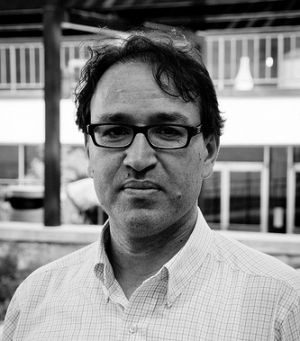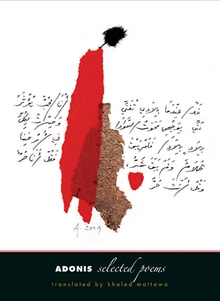
Khaled Mattawa is assistant professor of language and literature at the University of Michigan. Born in Benghazi, Libya, he emigrated to the United States as a teenager. He is the author of four books of poetry, most recently Tocqueville, and has translated five books of Arab poetry. Mattawa has received a PEN award for literary translation, a Guggenheim fellowship, and two Pushcart Prizes. He was selected by the Academy of American Poets as the recipient of the 2010 Academy Fellowship.

Judges’ Citation
From the swooping, Whitmanesque, epic voice of the early Songs of Mihyar of Damascus, to the erotic mysticism of the long poem ‘Body’ and the subdued meditations of Beginnings of the Body, Ends of the Sea, we are in the presence of a poet of global importance.
Adonis, along with Saadi Yousef and Mahmoud Darwish, has helped to bring into being modern Arabic poetry. Masterfully translated by Khaled Mattawa, his Selected Poems show a range comparable to Lorca’s, stretching from the sensuous to the political. When he left the Syrian socialist party in the early Sixties, Adonis left all traditional politics behind only to become committed to deep cultural transformation through the creative energies of poetry, in a quest for what could be called an Arabic modernism. In the case of his poetry, this new mode takes the form of a combination of metaphysics, interiority and solidarity, a hybrid present as well in the poetry of Rumi and the thought of Ibn Arabi. ‘I sang of gardens and a towering palace/while in wretchedness, in attics hid./Tell him who used to sleep on soft cushions/that the heights are being punished by a star.’ From the swooping, Whitmanesque, epic voice of the early Songs of Mihyar of Damascus, to the erotic mysticism of the long poem ‘Body’ and the subdued meditations of Beginnings of the Body, Ends of the Sea, we are in the presence of a poet of global importance.
Selected poems
by Khaled Mattawa
Even the wind wants
to become a cart
pulled by butterflies.
I remember madness
leaning for the first time
on the mind’s pillow.
I was talking to my body then
and my body was an idea
I wrote in red.
Red is the sun’s most beautiful throne
and all the other colors
worship on red rugs.
Night is another candle.
In every branch, an arm,
a message carried in space
echoed by the body of the wind.
The sun insists on dressing itself in fog
when it meets me:
Am I being scolded by the light?
Oh, my past days –
they used to walk in their sleep
and I used to lean on them.
Love and dreams are two parentheses.
Between them I place my body
and discover the world.
Many times
I saw the air fly with two grass feet
and the road dance with feet made of air.
My wishes are flowers
staining my days.
I was wounded early,
and early I learned
that wounds made me.
I still follow the child
who still walks inside me.
Now he stands at a staircase made of light
searching for a corner to rest in
and to read the face of night again.
If the moon were a house,
my feet would refuse to touch its doorstep.
They are taken by dust
carrying me to the air of seasons.
I walk,
one hand in the air,
the other caressing tresses
that I imagine.
A star is also
a pebble in the field of space.
He alone
who is joined to the horizon
can build new roads.
A moon, an old man,
his seat is night
and light is his walking stick.
What shall I say to the body I abandoned
in the rubble of the house
in which I was born?
No one can narrate my childhood
except those stars that flicker above it
and that leave footprints
on the evening’s path.
My childhood is still
being born in the palms of a light
whose name I do not know
and who names me.
Out of that river he made a mirror
and asked it about his sorrow.
He made rain out of his grief
and imitated the clouds.
Your childhood is a village.
You will never cross its boundaries
no matter how far you go.
His days are lakes,
his memories floating bodies.
You who are descending
from the mountains of the past,
how can you climb them again,
and why?
Time is a door
I cannot open.
My magic is worn,
my chants asleep.
I was born in a village,
small and secretive like a womb.
I never left it.
I love the ocean not the shores.
From Adonis: Selected Poems, by Adonis, translated by Khaled Mattawa
Copyright © 2010 by Yale University.
Celebrating Childhood
the original written by Adonis
A salute to Jacques Berque
I imagine his voice as the sound of a tambourine,
that the tambourine is broken in his throat,
that his throat is a fire named God.
I imagine a poet
into whose innards history pours
drenching his words and pooling at his feet,
a poet who rains blood that some hoist as a banner made of sky.
Copyright © 2010 by Yale University
from I Imagine a Poet
the Arabic written by Adonis
Man’s Song
Sideways,
I glimpsed your face drawn on the trunk of a palm
and saw the sun, black in your hands.
I tied my longing to that tree and carried night in a basket
carried the whole city
and scattered myself before your eyes.
Then I saw your face hungry like a child’s.
I circled it with invocations
and above it I sprinked jasmine buds.
Woman’s Song
Sideways,
I caught sight of his old man’s face
robbed by days and sorrows.
he came to me holding his green jars to his chest
rushing to the last supper.
Each jar was a bay
and a wedding held for a harbor and a boat
where days and shores drown
where seagulls probe their past and sailors divine the future.
He came to me hungry and I stretched my love toward him,
a loaf of bread, a glass cup, and a bed.
I opened the doors to wind and sun
and shared with him the last supper.
Copyright © 2010 by Yale University
Man’s Song / Woman’s Song
the Arabic written by Adonis
Not a star, not a prophet’s inspiration
not a pious face worshipping the moon,
here he comes like a pagan spear
invading the land of alphabets
bleeding, raising his hemorrhage to the sun.
Here he comes wearing the stone’s nakedness
thrusting his prayers into caves.
Here he comes
embracing the weightless earth.
Copyright © 2010
Not a Star
the Arabic written by Adonis